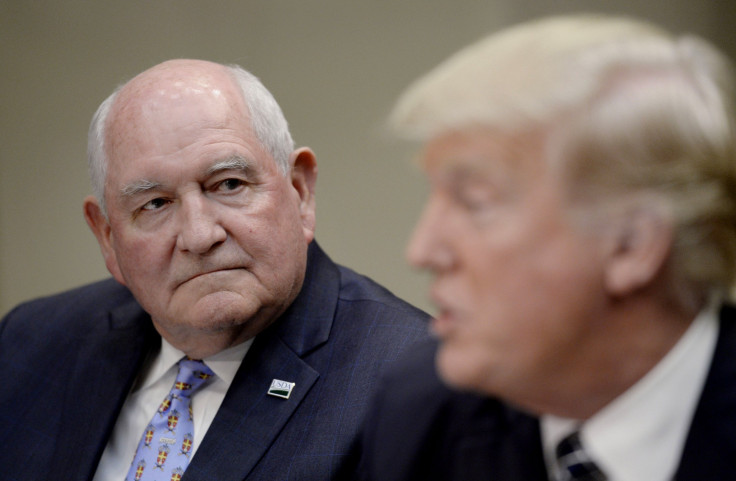USDA Plagued With Conflicts As It Sets Dietary Guidelines

“As use of high-fructose corn syrup has increased, so have levels of obesity and related health problems,” writes registered dietician Katherine Zeratsky on the Mayo Clinic website.
But at the U.S. Department of Agriculture (USDA), a recent corn syrup lobbyist is helping set the nation’s 2020 Dietary Guidelines and administer the National School Lunch and Breakfast Program.
Kailee Tkacz, who left her lobbying job with the Corn Refiners Association to join the USDA last July, has no significant nutritional science background, nor any degrees in other branches of science. According to her LinkedIn profile, she studied political science, government and American politics at two universities.
Nonetheless, as International Business Times recently reported, White House General Counsel Donald McGahn issued an ethics waiver allowing Tkacz to advise the USDA on its Dietary Guidelines despite having recently lobbied on the issue for the Corn Refiners Association. Before that, Tkacz lobbied on these guidelines on behalf of the SNAC International, a trade association representing over 400 producers of potato chips, popcorn, cheese snacks, pork rinds and other snack foods.
President Donald Trump campaigned on rooting out corruption in Washington, or “draining the swamp.” But even before he became president, lobbyists and special interests swarmed his transition team and many made their way into the administration.
“Trump campaigned on draining the swamp, but instead he brought all the swamp creatures back,” Jaydee Hanson, senior policy analyst at the Center for Food Safety, told IBT.
In a July 2017 announcement of new appointments to the USDA, Agriculture Sec. Sonny Perdue said that he had no doubt the corn syrup lobbyist “will help further our mission of feeding the world and making decisions in our nutrition programs that are science-based and data-driven” in her new role as USDA policy advisor.
Marion Nestle, professor emerita at New York University and an acclaimed nutrition expert, told IBT that Perdue “is really making decision after decision that looks like he’s going to protect the food industry. I’m kind of amazed at what he’s doing.”
Before joining the USDA, Tkacz was busy pushing the industry’s agenda in Washington, often at the agency where she now works. She lobbied the USDA on “monitoring regarding federal nutrition policy” and lobbied Congress on the “general background and recommendations for the Dietary Guidelines for Americans process” as recently as the fourth quarter of 2016. In the second quarter of 2015, for SNAC International, she lobbied the USDA on the Dietary Guidelines.
Lobbying reports often don’t disclose the client’s opinion on the issues being lobbied, merely naming those issues. But public comment letters offer some of these details. In an October 2015 letter to the USDA, Corn Refiners Association President and CEO John Bode disputed the 2015 Dietary Guidelines Advisory Committee’s “added sugars” upper daily intake limit and stated there is “no research basis for concluding that reducing ‘added sugars’ specifically will have a meaningful effect on [cardiovascular disease] risk,” among other criticisms. The letter says, “The American Academy of Pediatrics (AAP) affirms the role sugar can play in improving the quality of a child’s diet” and alleges that imposing new “added sugar” disclosure rules would violate First Amendment free speech rights.
Corn refiners “have a big public relations problem,” said Nestle. “People think that high fructose corn syrup is poison. The way they’re dealing with it is really aggressive.”

More ‘Swamp Creatures’ At The USDA
Tkacz isn’t the only recent food industry lobbyist inside the USDA. Also appointed in July was Maggie Lyons, a recent lobbyist for the National Grocers Association — for which Tkacz also once lobbied — who is now a senior advisor and chief of staff to another July appointee, Brandon Lipps, acting administrator of the Food and Nutrition Service and deputy under secretary of Food, Nutrition, and Consumer Services. Like Tkacz, Lyons was previously on the payroll of a right-wing group; she worked in Senate relations for the Heritage Foundation think tank and then the related 501(c)(4) advocacy group Heritage Action for America.
Unlike Tkacz, Lyons received no waiver to work on issues that she had previously lobbied on, although it’s likely she is doing just that. As recently as the second quarter of 2017, Lyons lobbied the USDA and Congress on the Supplemental Nutrition Assistance Program, which the USDA’s Food and Nutrition Service administers. In the fourth quarter of 2016, Lyons lobbied the USDA and Congress on legislation modifying the National School Lunch Program, a program she reportedly helps run.
Lipps does not have a lobbying background, but he once worked for Crenshaw, Dupree & Milam, a firm that works in agricultural law and has represented clients including food companies and industry trade organizations.
The Dietary Guidelines have been contentious since 1980, when the first guidelines came out. President George W. Bush further politicized the process by directing agencies, not scientists on an advisory committee, to finalize the guidelines. The 2017 appointments continue the trend of increasing politicization. As it stands today, Nestle said, “I didn’t think [the guidelines] could be more political, but I was wrong.”
Perdue, a multimillionaire, has conflicts of interest himself. Among his assets are ownership stakes in grain company AGrowStar LLC, Houston Fertilizer and Grain Co. and ProAg Products LLC, according to his financial disclosure. In a March 2017 ethics agreement, Perdue stated he would place many of his assets in a blind trust and refrain from taking part in decisions that would affect AGrowStar LLC until a promissory note from the company is fully paid; when that will happen is unclear.
The secretary resigned from positions at the National Grain and Feed Association and the Georgia Agribusiness Council as part of his 2017 ethics agreement. Regarding these two entities and some of his businesses, Perdue said, “I will not participate personally and substantially in any particular matter involving specific parties in which I know that entity is a party or represents a party, unless I am first authorized to participate.”
As governor of Georgia from 2003 to 2011, Perdue was accused of mixing his business interests with his political duties.
Potential Action
Rep. Don Beyer, a Virginia Democrat and member of the House Science Committee and its research and technology subcommittee, told IBT, “Dietary guidelines should be drafted by individuals with a science-based background in nutrition and dietetics. Kailee Tkacz’s career history indicates that her placement can only be for one reason — to help write guidelines more favorable to industry, thereby undermining science-based dietary guidelines and what is best for the public’s health.”
“We are looking at options in terms of recourse, but I think they will be quite limited given other appointees by this White House,” Aaron Fritschner, Beyer’s communications director, told IBT.
Nutrition groups are also interested in raising the issue. “We are increasingly concerned about high amounts of high fructose corn syrup,” said Hanson. “So we would be looking to get our members to weigh in on both the school lunch program and the dietary standards to make sure that this lobbyist doesn’t set the rules.”
“The USDA needs a staff of experts who understand the data and can create guidelines and an implementation program to support a food system that will provide healthy, safe, affordable food for everyone regardless of zip code,” Monica Mills, executive director of Food Policy Action, a 501(c)(4) advocacy group focused on making healthy food affordable, told IBT. “Unfortunately, hiring Kailee Tkacz, a lobbyist for the Corn Refiners Association, will be extremely counterproductive to seeing USDA achieve these goals. This is just another example of big agriculture/big business having the advantage over small family farmers and everyone who eats. We deserve better."
A USDA spokesperson declined to comment for this story. Repeated emails to Tkacz and to Amanda Heitkamp, the USDA’s communications officer for food safety and marketing and regulatory programs, were not returned.
© Copyright IBTimes 2024. All rights reserved.





















